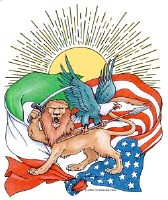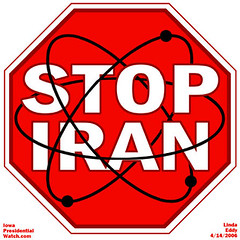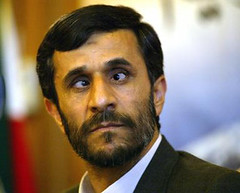Monday, February 18, 2008
NON-INTELLIGENCE ON IRAN NUKES & Appalling Gamesmanship at the CIA
Alan Note: I have not seen much in the Media about the purloined laptop obtained from inside Iran which proves Iran is working on nuclear weapons. Why the silence?
Also as a sidebar, read the article on the "News Views" Page titled Dhimmi England Seeks Sharia Bonds. It's not just the Archbishop of Canterbury pushing for Shaira law recognition. The Prime Minister is also lunging in that direction. http://alanpetersnewsbriefs.blogspot.com/
Main Article
by Michael Rubin
During his February 5 testimony before the Senate Intelligence Committee, Director of National Intelligence Mike McConnell backpedaled from the December 2007 National Intelligence Estimate (NIE) and its claim that, "in fall 2003, Tehran halted its nuclear weapons program."
Not only did McConnell testify that the Islamic Republic was working to master the enrichment of uranium - "the most difficult challenge in nuclear production" - but he also acknowledged that, "because of intelligence gaps," the U.S. government could not be certain that the Iranian government had fully suspended its covert nuclear programs.
"We assess with high confidence that Iran has the scientific, technical, and industrial capacity eventually to produce nuclear weapons," he testified. "In our judgment, only an Iranian political decision to abandon a nuclear weapons objective would plausibly keep Iran from eventually producing nuclear weapons - and such a decision is inherently reversible."
The NIE was no accident, and McConnell's pirouette does more than confirm the intelligence community's sloppiness. The 2007 NIE was built on geopolitical assumptions as much as any hard intelligence, and historians will deem it important not because it was accurate, but because it made utterly clear the collapse of the intelligence community.
While the crudeness of its assault on the (U.S.) president's Iran policy makes it the best example of the intelligence community's agenda politics, it is far from the only one.
My initiation into CIA policy plays came less than a week after Baghdad's fall to coalition forces in April 2003. In the months before the war, U.S. government officials had assessed thousands of Iraqi political activists and technocrats in order to prepare to fill the Iraqi political vacuum.
Representatives from State, the Pentagon, and the National Security Council were meeting to vet invitations for the Nasiriya Conference where Iraqis would discuss post-liberation governance.
Rather than simply present the biographies of the various Iraqi figures, the CIA sought to be a privileged policy player. Its representative announced that not only would Langley be inviting its own candidates outside the interagency consensus, but the CIA would not be sharing the names or backgrounds of its invitees.
Putting aside the ridiculousness of the CIA belief that it could invite delegates anonymously to a public conference, more troubling was the principle. Far from limiting its work to intelligence, the CIA leadership was unabashedly involving itself in major policy initiatives.
The reverberations of Langley's policy games haunted reconstruction. CIA officials would promise governorships to Iraqis without any coordination.
Often, diplomats, military officials, and Pentagon civilians would learn of such deals only after other Iraqis had been appointed or elected to such offices. (Some U.S. servicemen surely paid the price as spurned Iraqis responded to what they saw as betrayal.)
Once the son of a Kurdish leader remarked how ridiculous State-Defense bickering was when the CIA had implemented and funded a decision on the policy issue months before without any coordination whatsoever.
Many of the agency's (CYA deskjockey) senior analysts are arrogant after years behind their computers, believing they know far better what U.S. policy should be than the policymakers for whom they draft reports.
The recourse of the disgruntled, bored, or politicized analyst is the leak - the bread and butter of any national security correspondent.
Journalists who fulfill the leakers' objectives win ever more tantalizing scoops; those who maintain professional integrity and question the agenda behind any leak, find their access cut.
The result is a situation in which journalists who might otherwise double-check sources, take a single intelligence analyst at his word, even if he is using them to fight a policy battle.
Iraq again provides a case study. In order to shield themselves from accountability over flawed intelligence or to bolster their Iraqi proxies at the expense of competitors, CIA officials provided a steady stream of leaks to favored correspondents like the New Yorker's Seymour Hersh or McClatchy's Warren Strobel.
Such leaks ranged from allegations that the Pentagon's Office of Special Plans - a policy shop - was a rogue intelligence operation to misattributions of the provenance of prewar intelligence.
It was not uncommon, for example, to see false or exaggerated intelligence attributed to the Iraqi National Congress leader Ahmad Chalabi when it had actually come from Kurdish officials. This was never more clear than in a July 17, 2004, New York Times correction.
The paper was retracting three stories which alleged a connection between Chalabi and an Iraqi source code-named Curveball, whose information later turned out to be bogus. The editors explained that their correspondent had "attribute[d] that account to American intelligence officials who spoke on condition of anonymity.
" They continued: "Those officials now say that there was no such established relationship." In other words, intelligence officials lied to a reporter to achieve a policy aim.
Such behavior is not limited to debates over policies impacting countries thousands of miles away. W. Patrick Lang, a former Defense Intelligence Agency official, told the American Prospect in 2005 that his intelligence community colleagues used leaks to try to influence the 2004 presidential election.
"Of course they were leaking. They told me about it at the time. They thought it was funny. They'd say things like, 'This last thing that came out, surely people will pay attention to that. They won't reelect this man.' " The intelligence leadership did not refer the matter to the judiciary, unlike the leak concerning Valerie Plame.
To deflect criticism of the NIE, intelligence officials reached out to reporters. "Hundreds of officials were involved and thousands of documents were drawn upon in this report . . . making it impossible for any official to overly sway it," the Wall Street Journal was told.
Wayne White, a former analyst in State's Bureau of Intelligence and Research, suggested it was "absolutely disgusting" that anyone could impugn the professionalism of lead author (and his former colleague) Thomas Fingar. This is disingenuous.
Personnel are policy. Half of Washington's battles involve who writes the first and last drafts of any paper or memo.
McConnell's testimony undercut the idea that the intelligence agencies deserve a reputation for either professionalism or integrity. A tolerance for political gamesmanship has besmirched the entire community.
With the NIE giving Iran what President Mahmoud Ahmadinejad declared its "greatest victory during the past 100 years," the consequence for U.S. national security is grave.
In the wake of the Iraq war, many Democrats accused the Bush administration of politicizing intelligence. It was a false charge, but good politics. But the fact is, the problem was the opposite: an intelligence community driven by the desire to conduct policy.
Michael Rubin, a resident scholar at the American Enterprise Institute and editor of the Middle East Quarterly, was an Iran country director at the Pentagon between September 2002 and April 2004.
Subscribe to:
Post Comments (Atom)














1 comment:
Did you say today is your birthday?
Have a great one.
Debbie Hamilton
Right Truth
Post a Comment